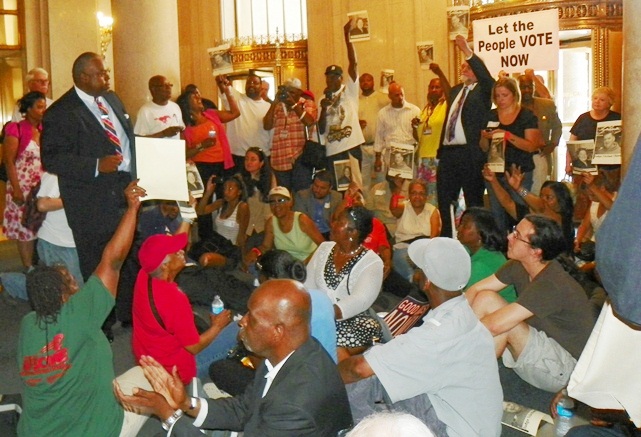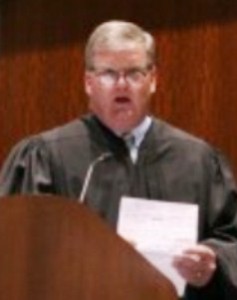-
COA rejects lawsuit v. DPS EFM Roy Roberts, PA 72 standing
- State high court chief justice earlier noted law negating return of repealed acts
By Diane Bukowski
November 17, 2012
DETROIT – Highland Park School Board member Robert Davis, who has ceaselessly fought Michigan’s Public Act 4, repealed Nov. 6, has forced the issue of whether all the state’s “emergency financial managers” must now be ousted to the state Supreme Court.
In response to Davis’s lawsuit filed Nov. 13, a Michigan Court of Appeals (COA) First District panel ruled Nov. 16 that Detroit Public Schools Emergency Manager Roy Roberts remains in place under PA 4’s predecessor law Public Act 72.
“I’m thankful for their expeditious review of the matter, and now once and for all the Supreme Court is going to decide the issue and the will of the people,” Davis responded in published remarks.
State Treasurer Andy Dillion re-appointed Roberts and seven other PA 4 emergency managers as PA 72 “emergency financial managers” after the placement of PA 4 on the ballot, pending the November vote.
The COA opinion echoed Attorney General Bill Schuette’s stance that voters repealed PA 4’s repeal of PA 72. During oral arguments on whether to put the PA 4 referendum on the ballot July 25, Michigan Supreme Court Chief Justice Robert Young, Jr. appeared to scoff at that opinion.
He read into the record MCL 8.4, which says, “Whenever a statute, or any part thereof shall be repealed by a subsequent statute, such statute, or any part thereof, so repealed, shall not be revived by the repeal of such subsequent repealing statute.”
When he asked the COA for a writ of mandamus enforcing MCL 8.4 on Nov. 13, Davis said, “The law in the state of Michigan is very clear . . . . When an act is repealed, it’s as if it never existed.”
The First District COA panel disagreed.
“Petitioner’s reliance on the anti-revival statute, MCL 8.4, is unavailing,” Presiding Judge Kirsten Frank Kelly wrote. “The plain language of MCL 8.4 includes no reference to statutes that have been rejected by referendum. The statutory language refers only to statutes subject to repeal. Judicial construction is not permitted when the language is unambiguous. Driver v Naini, 490 Mich 239, 247; 802 NW2d 311 (2011). Accordingly, under the clear terms of the statute, MCL 8.4 does not apply to the voters’ rejection, by referendum, of P A 4. Even if the rejection of P A 4 is deemed to operate as a repeal subject to MCL 8.4, the voters rejected P A 4 in its entirety by way of the referendum.” Click on Davis v Roberts COA for ruling.
“Oh, really?” Chief Justice Young responded to the Schuette’s attorney John Pirich, July 25. http://cst.clickstreamtv.net/mpi/cst.html?account=sbm&clip=&flashVersion=10&playlist=07_25_12_msc&realVersion=&route=1&cstSessionID=8017731&sessionID=M20121
Two of the three judges on the appeals panel, Kirsten Frank Kelly and Michael Riordan, were on the panel that delayed placement of the PA 4 referendum on the ballot, after hearing arguments on the petition’s type size. Although they essentially supported voters’ right to the referendum, they refused to order the Board of Canvassers to comply. Instead they unsuccessfully asked for a meeting of the entire Appeals Court to clarify the matte
Attorneys for Stand Up for Democracy and others then appealed to the Supreme Court, which ordered the referendum’s placement on the ballot.
Riordan was appointed to the Court of Appeals by Governor Rick Snyder this year. Snyder previously considered appointing Kelly to the Supreme Court. The third appeals judge, Christopher Murray, was previously chief legal counsel for former Governor John Engler.

Protesters occupied the lobby of Cadillac Place, where the Appeals Court meets, on June 28, 2012 to demand placement of PA 4 referendum on ballot.
The stance of the entire Supreme Court remains to be seen when Davis’ appeal is heard. Young is one of the ultraconservative justices on the Court who has been supported by the Republican Party. Whether the more “liberal” justices will agree with the COA is questionable.

- Pontiac City Council member Kermit WIlliams is one of the plaintiffs in the lawsuit v. PA 72 filed Sept. 26.
Earlier on September 26, the Sugar Law Center, The Center For Constitutional Rights, Sanders Law Firm, Melvin “Butch” Hollowell and Goodman & Hurwitz PC filed suit in Ingham County Circuit Court on behalf of Council members from Pontiac City Council members Donald Watkins and Kermit Williams, four Benton Harbor city commissioners, and all nine members of the Flint City Council.
“At this moment, there is no law authorizing the use of emergency managers in the state of Michigan,” Sugar Law Center director John Philo said in a release. “The suit we filed is based on the obvious fact that there cannot be emergency managers without the legal framework to support them. The new law has been suspended and the old law is dead.”
The suit asks for the restoration of the council members to their legally elected positions, and the removal of “emergency financial managers” Joe Harris of Benton Harbor, Ed Kurtz of Flint, and Louis Schimmel of Pontiac. The suit challenges the reinstatement of PA 72 prior to the election.
The case is set to be heard Dec. 5, 2012 before Ingham County Circuit Court Judge Rosemarie Aquilina.
A separate lawsuit filed by members of the Flint City Council led by its chair Scott Kincaid awaits hearing in Genessee County Circuit Court Judge Neithercut Dec. 18, 2012.
EM’s and EFM’s in all the cities involved have sold off city assets such as the Pontiac Silverdome and the city’s 11 water plants, parts of Benton Harbor’s publicly-owned Jean Klock Park, its public radio station, and golf courses in Flint, along with laying off hundreds of city workers and privatizing city services. ‘
“I think what it shows is that the issue is bigger than Flint, and emergency manager law doesn’t fix the long-term problems that the state creates by cutting our revenue, declining property values and legacy costs,” Kincaid said in published remarks.
Emergency financial managers continue to operate also in the cities of Ecorse and Allen Park and the school districts of Highland Park and Muskegon.
Whether the residents of Michigan will continue to stand for this policy of “Justice Delayed is Justice Denied” remains to be seen. Rev. Edward Pinkney, a long-time community leader in Benton Harbor, addressed the need for a people’s fight for democracy, in the streets if need be. (See video below.)












We have got to repeal this unjust law. While testifying in Lansing last week much was revealed concerning the plot to destroy public schools led by ALEC, who use puppits like Roberts and Cunningham to carry out their command.